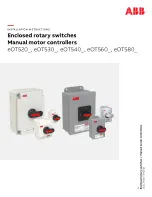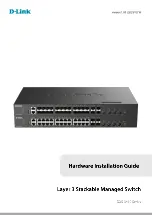
50
5 . I N s Ta L L I N G a N D r em ov I N G C I r C u I T b r e a k er s
5.1 General
Inspection and preparation of circuit breakers
Before installing, operating, or removing a circuit
breaker, refer to the breaker instruction manual for
preparation, inspection, and test. Check thoroughly
for damaged or loose parts and for any dirt or
foreign matter which may be in the breaker. Be sure
that a thin film of lubricating grease is present on
primary disconnects of the switchgear before
installing the breaker.
Circuit breaker installation
To install a circuit breaker, proceed as follows:
1. Before installing check the contact areas on each
primary disconnect bar or cluster of fingers for
foreign matter that may have accumulated. Clean
these areas if necessary. Be sure that a thin film
of lubricating grease covers the contact areas
before putting a breaker in the compartment.
2. Check to see that the breakers match their
respective compartments. Each breaker is
assigned a part or mark number. This number
is shown on the breaker sheets of the summary,
the front view drawings, and on the
identification card on the breaker shipping
carton. The breaker may also be identified
using the 20 digit catalog number (AKD-20
Only) or using the 10 digit catalog number
(Entellisys Only).
3. To locate the breaker in the proper compartment,
refer to the breaker location list on the front
view drawing. Find the proper breaker by the
identification card on the breaker carton.
All identical breakers will have the same mark
and catalog number.
5. Installing and removing
circuit breakers
Rejection feature
Draw-out breakers of the same type and
ratings are interchangeable in their equipment
compartments. Draw-out breakers of different
type or short-circuit rating are intentionally made
noninterchangeable to prevent inserting the wrong
type breaker into a draw-out compartment; Unique
"rejection hardware" is affixed to each breaker and
its cassette. When the wrong type breaker is
inserted into a compartment, the pins on the
breaker and the blocks in the cassette interfere,
thus preventing the wrong breaker from being
racked onto the primary stabs.
—
Fig. 5.1
—
Fig. 5.2
—
Fig. 5.1
Rejection block mounting
used in cassette
—
Fig. 5.2
Rejection pin mounting
used on entelliguard
circuit breaker
















































